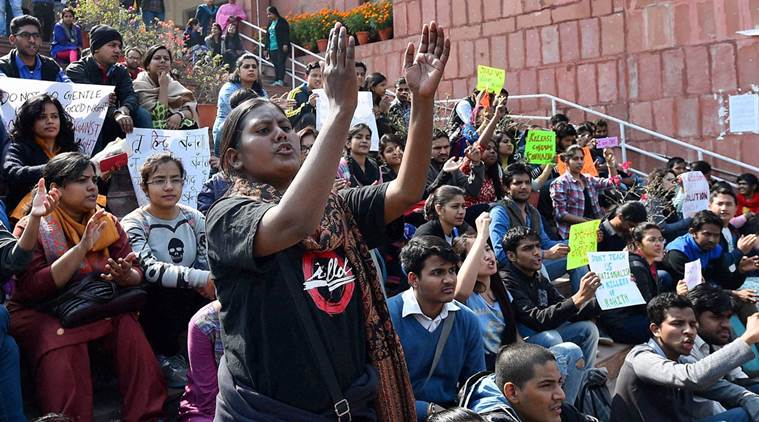JNU Row: The common man is not going to take this anymore
A couple of days back I saw a group of around 40-50 people passing through the nearby lane of my apartment in Gurgaon. It was a kind of procession and they were constantly raising slogans like “Bharat Mata ki Jai” and ” Vande- Mataram”. As they came nearer I could identify few who were the residents of my society.
Gurgaon is politically languid. At times, we jokingly say that half of the people of Gurgaon believe that Kejriwal is their Chief Minister. From past 6 years, I have not witnessed even a single political activity around my locality. So what has changed? Why are these people trying to disturb the “shop and drink” culture of Gurgaon?
Using writer’s freedom, I assume, which in all possibility is most likely, that these people were common taxpayers of this country who chose to come out in solidarity with their country instead of watching crap TV debates after returning from office on a particular Monday evening. I will call it “awakening of conscience” of common mass (intentionally dropping the word political out of it).
Some of you may have screamed by now, “so what” and “what a big deal” with the logic of generalizing a singular event to common mass is a pure overreaction. Yes, it is indeed an overreaction and that is my point!
These singular, isolated stray incidents have hijacked Indian politics for over a year now. Be it Lalit-gate, Sadhvi’s & Yogi’s comments, Church attacks, Dadri lynching, Rohith Vemula suicide and now JNU row. A pattern seems to be emerging that before each parliamentary session, the united opposition makes an issue out of a sensitive incident and create a hullabaloo to set the stage for doing further ruckus in parliament.
JNU Row: Just another episode in the long chain of events
Let us look this JNU Row more closely and try to identify the pattern. A handful of students organized a gathering to register their protest against the hanging of Afzal Guru. Afzal Guru was convicted in 2003 and hung in 2013 for a crime committed in 2001. One and half decades after the conviction a protest march was held in one of the premier university of India. A video footage was surfaced in which the protestors were found raising anti-India slogans. Not all, but some of the key perpetrators were arrested and sent to custody. A crime was committed by some people and based on primary investigation police arrested a few. It was a simple and straightforward case unless there is no immediate parliamentary session, the incident had not happened in any metro city of India which has convenient media reach, protestors had not been anti-right and the topic had not been sensational. The group of cry baby politicians flocked at the venue under live media coverage to set the stage for the most important budget session. The irony is that the protest was led by Congress vice president Rahul Gandhi in whose govt Afzal Guru was secretly hanged without informing his family members.
JNU Row: We are done with the rhetorics
Are we tired of these rhetorics? Yes, of course! There are several very important issues which need an urgent attention and redress. How can Rohith Vemula suicide debate help in reducing farmers suicide rate? How can a JNU row help to make us better equipped in fighting terrorism? How can intolerance debate help in raising people above the poverty line? So on and so forth. There is a total disconnect in what common citizen of this country want and what our political leaders want. Worse is that even the parliament is used to satisfy the desires of political parties than fulfilling the needs of common man. If the govt goes defensive in counter, it is perceived as guilty while if it becomes aggressive it is labelled as fascist. This mockery of democracy needs to stop.
But how? There are two components of this ongoing tussle. One is between the leaders of political parties for their political ambitions and the other is between two establishments. The battle between political leaders is simple and square. The battle between two establishments is now heating up. On one hand, the mighty establishment comprising of left-leaning intellectuals, media heavyweights, self-styled commentators and various award winners. The tectonic shift in India’s mandate had shaken this establishment. They have everything to lose. On the other hand, there are a few right-wing supporters who want their say in the bigger scheme of things. They are fighting for the equality. They believe that it is the period of their renaissance.
JNU Row: Center-Right is scattered and feeble
Are the second group losing? Obviously yes. The biggest reason for their loss is that they are not fighting with similar weapons. The first group has coined few of the convenient contrivances like secularism, minority welfare and now intolerance. They use these at their disposal. The other group has still not come up with anything near those. They are frightened to liberate themselves from the self-imposed envelope of unknown. Patriotism is one such tool which can be as lethal in counter-attack. But you can’t give “Brahmastra” to idiots. The Shadhvis and Girirajs have done more harm than good. ‘Patriotism’ should be used sophistically and circuitously for garnering results.
So, has opposition misjudged the case this time? It appears so. The attempted yorker turned out to be at good length on a flat pitch. The ruling party has hit it hard and the opposition rapidly going cold on the issue is a clear proof. Hitting hard consistently is the need of the hour.
The described event in the beginning and JNU row is argumentatively equally poised and should have an equal impact in the ideal world. But who wants to hear the good news? The onus is also on us to exercise the right to hear the right news.
